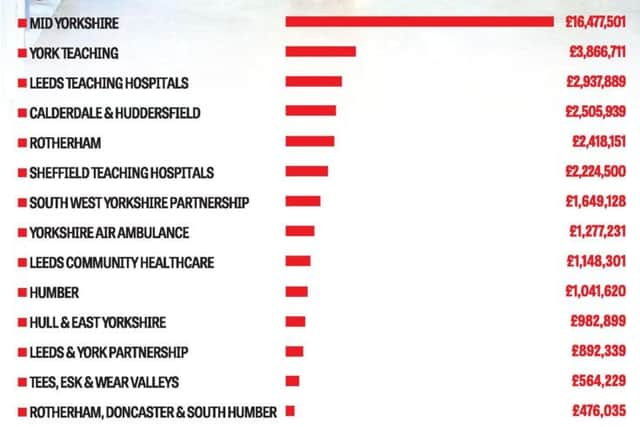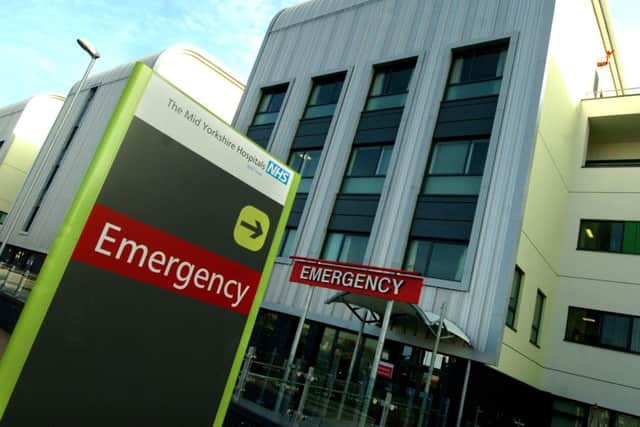Yorkshire NHS trust which paid £15m to '˜big four' consultants hands out another seven-figure contract


Mid Yorkshire Hospitals NHS Trust was heavily criticised over its contract with EY, previously known as Ernst & Young, which ended in September 2015 and was designed to help bosses cut a £37m annual deficit.
It can now be revealed that only a year after the contract ended, the trust has paid out nearly £1.7m on a contract with another leading consultancy firm, Deloitte, to help it balance its books “while maintaining delivery of safe care”.
Advertisement
Hide AdAdvertisement
Hide AdThe disclosure relating to the NHS’s ‘Financial Improvement Programme’ has prompted claims that services are being “bled dry by big accountancy firms”, though bosses say the cost is more than cancelled out by savings and other benefits.


Analysis by The Yorkshire Post reveals that the region’s hospital trusts have spent nearly £40m on ‘big four’ accountancy firms EY, Deloitte, KPMG and PricewaterhouseCoopers, as well as leading rival Grant Thornton, over four years.
More than a third of this, £16.5m, was spent by Mid-Yorkshire, which runs hospitals in Wakefield, Pontefract and Dewsbury, but five trusts ran up bills of more than £2m each over four years.
This includes York Teaching Hospital Trust, which runs eight hospitals across North Yorkshire and spent £3.9m between 2011/12 and 2015/16. Leeds Teaching Hospitals Trust, the largest in the region, spent £2.94m.
Advertisement
Hide AdAdvertisement
Hide AdMid-Yorkshire’s hospital trust has come under fire in the last year for its poor performance in a number of areas. It saw the second highest number of complaints of hospital trusts in 2015 and was the region’s worst performing trust against A&E targets. Last summer, it was reported to have a £20m financial deficit after an overspend on temporary workers.


The trust said the four-year contract with EY helped “stabilise and improve” its financial position, and that the Deloitte contract was awarded through a “competitive process”.
Adrian O’Malley, secretary for the Mid Yorkshire Health branch of Unison, described the cost of employing private consultants as “mind-boggling” given the six per cent efficiency savings NHS trusts were being asked to make.
He said: “The NHS is being bled dry by these big accountancy firms and the Government is party to it. The politicians who allow this to happen she be held to account and forced to explain their reasons for wasting our money at a time of austerity and pay freezes for the rest of us.”
Advertisement
Hide AdAdvertisement
Hide AdBut Paul Connolly of the Management Consultancies Association said EY’s work in Yorkshire won a national award and many healthcare initiatives came from the work of consultants. Nationally, the spend on consultants has been falling.


Mid-Yorkshire Hospitals NHS Trust said Ernst & Young helped to “stabilise and improve the trust’s underlying financial position” after finding “significant financial issues” in 2011/12.
Director of Finance Jane Hazelgrave told The Yorkshire Post that the contract with Deloitte was awarded through a competitive process managed by NHS Improvement, a body that oversees health trusts.
The work is divided up into three phases, with the first two costing £994,000 plus VAT and the third costing £397,000 plus VAT.
Advertisement
Hide AdAdvertisement
Hide AdIt came out of the national Financial Improvement Programme scheme, where NHS trusts are chosen and helped to bring about millions in savings through a programme of intensive financial support.


Deloitte worked with consultancy firm Four Eyes, which says its mission is to “find, deliver and implement significant efficiencies for hospitals and trusts through an approach designed by clinicians for clinicians”.
Ms Hazelgrove said: “All of the schemes identified have been developed in tandem with MYHT operational managers and scheme leads supported by Deloitte or Four Eyes consultants.
“This co-production approach has ensured that there is ownership within operational teams and services.
Advertisement
Hide AdAdvertisement
Hide Ad“The delivery of schemes will sit with MYHT employees to deliver on an ongoing basis and will be monitored through the Trust’s in-house Programme Management Office (which was established six months ago) and scheme leads that will be held to account for delivery through the trust’s weekly review group.
“The Trust has recently appointed a new management team within Theatres and there have been other changes to key personnel in this area. The executive team believes that this additional intense support from Four Eyes is required to support this new management team in fully embedding new ways of working and ensure that the positive gains are sustainably delivered.
She added: “The expectation is that the fees are more than compensated for by the efficiencies the Trust will accrue as part of this work.”